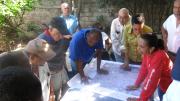On January 18, six days after Haiti's devastating earthquake, the Center for Geographic Analysis gave wall maps printed at Harvard to a delegation from Boston University traveling to the disaster-stricken nation. They hoped their maps could help fill the gaps in information available to the local and international responders who were trying to aid the injured and help the country turn to rebuilding.
They received evidence of this sooner than they'd anticipated: a week later, the maps showed up in a photograph in a BU publication. It showed two of the BU delegation leaders, Jean-Lucien Ligondé and assistant professor of city planning and urban affairs Enrique Silva, standing over them in conversation with Haitian president René Préval. (Another photograph of the maps in use appears above.)
Such successful aid efforts provide small comfort amid the news coming out of Haiti, where an estimated 200,000 people were killed and 700,000 left homeless. (Harvard Humanitarian Initiative director Michael VanRooyen has been posting regular updates on the situation in Haiti on the website for the organization, which coordinated deployment of more than 70 Harvard-affiliated nurses, anesthesiologists, surgeons, and emergency physicians in the days after the earthquake.)
As aid efforts continue on the ground, initiatives for relief and remembrance, as well as analysis, are being planned on campus. On February 11 at noon, Presley professor of social medicine Paul Farmer will lead a discussion on current conditions in Haiti. It takes place at Harvard Medical School and will be streamed live over the Internet. (Farmer is the cofounder of Partners in Health, a nonprofit that has worked to provide medical care in Haiti for two decades. Navigate to the University Gazette website to read advice from Farmer and six other Harvard experts on how to help Haiti get back on its feet, and another about a field hospital started by two Harvard-affiliated physicians.)
The same day at 2 p.m., President Drew Faust and Haitian members of the Harvard community are scheduled to speak at a service in the Memorial Church. The service is being planned to honor the victims of the January 12 earthquake.
And on February 12 at 7 p.m., Harvard student artists, in collaboration with the Office for the Arts at Harvard, will give a benefit concert in Sanders Theatre. The program features several dance troupes and musicians including Malcolm Campbell ’10. The entire ticket price of $25 will go directly to Partners in Health.









